Illinois Workers’ Compensation Commission
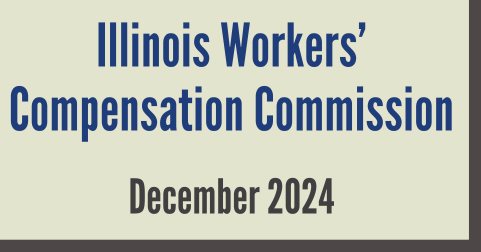
IAIABC: Please provide an organizational overview (number of employees, years in business, vision)
Michael J. Brennan, Chairman, Illinois Workers' Compensation Commission: The Illinois Workers’ Compensation Commission resolves claims made by injured workers for injuries arising out of and in the course of employment. The Commission strives to assure financial protection for injured workers and their dependents at a fair cost to employers. The Commission performs three main functions:
- Resolves claims. The Commission strives to provide a fair, timely process by which disputed claims may be resolved.
- Ensures compliance with the law. The Commission protects the rights of employees and employers under the Illinois Workers’ Compensation and Occupational Diseases Acts.
- Administers self-insurance. The Commission evaluates and approves eligible employers that wish to insure themselves for their workers’ compensation liabilities.
The Commission strives to accomplish these goals while looking constantly for ways to improve the quality of service.
The IWCC currently employs 143 people which include 34 Arbitrators who review initial claims, and 10 Commissioners, including our Chairman who may review an arbitrator decision. We have offices in Chicago, Springfield, Collinsville, Rockford, and Peoria as well as other hearing sites throughout the State of Illinois.
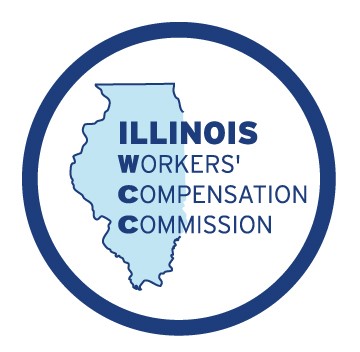
IAIABC: How does your organization serve the workers’ compensation industry?
MB: By statute, the IWCC has specific duties and obligations in the industry. Its primary function is to facilitate the adjudication of claims filed by injured workers against their employers. Ours is an adversarial system, and all litigants may be represented by attorneys.
Our Arbitrators act as trial judges and take evidence at hearings from the parties. A transcript of those proceedings, which are held in-person, is taken by a certified court reporter. The Arbitrator renders the first Decision regarding any claim.
The Commissioners sit in Review of those proceedings and may make any changes to an Arbitrator’s Decision as they see fit. If there is dissatisfaction with the Commission’s Decision, the parties may then appeal to the courts. However, the record made before the Arbitrator is the only record that is used in these proceedings.
Concomitantly, the Commission regulates Self-Insured employers in Illinois. By this, the IWCC determines the security level required to guarantee that a Self-Insured’s claims will be paid in the event of a bankruptcy. More than 500,000 employees in Illinois work for Self-Insured companies. There are more than 500 entities that are Self-Insured in Illinois.
The IWCC also manages the payment of Rate Adjustment Fund and Second Injury Fund benefits to injured workers that are permanently and totally disabled. The Rate Adjustment Fund is an inflation hedge for each worker or beneficiary. The Second Injury Fund was instituted to encourage employers to hire partially disabled workers.
Finally, the IWCC manages the payment of benefits from the Injured Workers’ Benefit Fund. This fund was created to secure some method of payment for those injured workers whose employer failed to secure insurance. The benefits are paid from fines and penalties collected from uninsured employers.
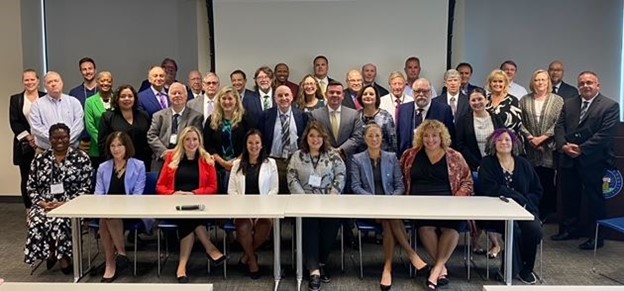
Arbitrators and Commissioners at our biannual judicial training September 19, 2024.
IAIABC: What do you see as some of the major challenges the industry is facing, and how can we as a community address them?
MB: Since its inception, some employers have attempted to walk away from their responsibilities under workers’ compensation statutes. This problem has been ongoing for the one hundred plus years that Workers’ Compensation Acts have been in existence.
In the past, certain employers thumbed their nose at the statues, with little recourse for their employees. Enforcement of the provisions of our WC Act has improved over the last decade, but it remains a problem, as methods of avoidance become more sophisticated.
Today, we have gig employees, misclassified employees, alleged independent contractors and other methods of Workers' Compensation Act avoidance.
Additionally, medical costs still drive the cost of insurance for all employers. In Illinois, our fee schedule has brought many costs under control, but we must remain diligent in our efforts to control costs and provide the best possible care for our injured workers. This is the balancing act that the IWCC must perform in considering the appropriate payment for medical care and the needs of medical providers.
IAIABC: Are there any projects/programs/initiatives going on at your organization that you are particularly excited or enthusiastic about?
MB: As a totally paperless quasi-judicial agency, we have continued to adapt to the many changes that were necessitated by the Covid-19 pandemic. Those changes were necessary at the time and have led to greater efficiencies that continue today. Most IWCC activities, involving practice before the Commission, are conducted on-line. These include filing of documents, appearances at monthly status calls, and participation in pre-trial conferences.
We have now completed the integration of the remaining functions of the IWCC into the virtual world. In addition to its quasi-judicial role, the Commission is responsible for the regulation of all self-insured employers. All self-insurance documents are now transmitted electronically. These include applications, renewals and financial details that must be submitted by each self-insured. Even our method of assessment payment may now be done electronically.
All cases prior to the onset of our digital system in April 2021 are in paper format. So, what do we do with all that paper now that we are “paperless”? We have undertaken the significant project of digitizing all legacy files. Already our office has scanned and uploaded over 63,000 files from our shelves. Soon we will begin digitizing an additional 12,000 boxes of files from our external warehouse. This is a combined effort of several divisions, led by our Central File Department. We have received positive feedback from our stakeholders on this initiative, as now Petitioners and Respondents can readily access older case information online.
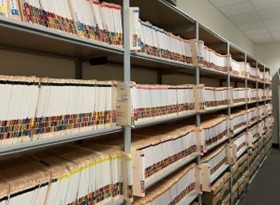 |
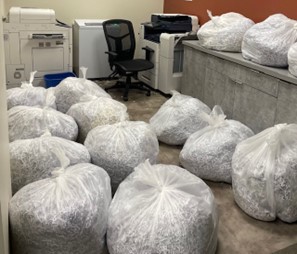 |
| Working towards a completely | paperless office by digitizing our files. |
IAIABC: What's an interesting fact about your organization that most people don't know?
MB: We stayed open during COVID, when our common law courts were closed for more than a year. And, though all our evidentiary hearings remained in-person, no one contracted Covid-19 as a result of any of our hearings, during that time.
IAIABC: Why is your organization a member of the IAIABC? What would you tell others about the benefits of membership?
MB: From a pure operational aspect, the IAIABC EDI Platform is second to none. It provides an excellent reporting platform.
On a personal level, since becoming an active member in 2011, the IWCC began attending the Central States Association and Annual Conventions. At these meetings, the IWCC developed working relationships and friendships with similarly situated workers’ compensation industry and regulatory employees. These relationships have fostered an environment where guidance, input and solutions have been shared between the states. For example, our Insurance Compliance Unit in Illinois conducted an on-site visit with their counterparts in Kansas. They returned with enhanced enforcement/investigative techniques. Additionally, the State of Minnesota assists with out-of-state medical bill/fee schedule expertise. Their assistance was of great benefit to attorneys in Illinois with medical provider issues.
Finally, by no means should the social aspect of membership be minimized. Put simply, we at the Illinois Workers’ Compensation Commission have made long lasting friendships with true interest in fostering a better workers’ compensation system through the county and beyond. These friendships and business contacts have been priceless.
